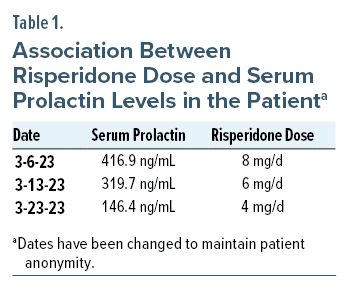Risperidone is an atypical (second generation) antipsychotic medication. It has better efficacy and cost-effectiveness than some other antipsychotic medications; therefore, it is commonly prescribed in clinical practice to control symptoms in major psychiatric illnesses.1 Risperidone is known to cause hyperprolactinemia, with levels rarely exceeding 200 ng/mL. We report a case of risperidone-induced galactorrhea with prolactin levels of 416 ng/mL a few days after initiation of risperidone.
Case Report
A 40-year-old married female homemaker, of lower middle socioeconomic status, was admitted to the hospital with an illness of 8 years duration characterized by irritability, low mood, social withdrawal, anhedonia, suspiciousness, verbal and physical aggression, and hallucinatory behavior. She was diagnosed with paranoid schizophrenia with a score of 64 (P14, N18, G32) on the Positive and Negative Syndrome Scale (PANSS)2 and 44 on the Brief Psychiatric Rating Scale (BPRS)3 at baseline.
The patient was started on risperidone 2 mg/d orally. At admission, she was found to have a regular menstrual cycle of 3 days duration before starting risperidone, and her last menstrual period was 1 week ago. Since there was minimal improvement in psychopathology, tablet risperidone was gradually increased to 8 mg/d over 4 weeks. Within 4 days of uptitrating the medication to 8 mg, the patient started to complain of galactorrhea and missed her menstrual cycle. On examination, milk was expressed from bilateral breasts. Her serum prolactin level was 416.9 ng/mL. Her score on the Glasgow Antipsychotic Side Effect Scale (GASS)4 was 16.
According to the Maudsley guidelines,5 prolactinoma should be ruled out if the prolactin level is > 200 ng/mL. Contrast-enhanced magnetic resonance imaging (MRI) of the brain revealed normal results. Tablet risperidone was cross-tapered with tablet aripiprazole given evidence to correct prolactinemia.6
Over 3 weeks, the patient’s serum prolactin levels decreased to 146.4 ng/mL on risperidone 4 mg/d and aripiprazole 15 mg/d orally; she also had her mensuration, and there was no galactorrhea (Table 1). There was improvement on scales for psychopathology and side effects (PANSS: 32 [P8, N7, G17], BPRS: 24, GASS: 5).
Discussion
As per Maudsley guidelines,5 in a patient with hyperprolactinemia, treatment should be guided by the clinical symptoms rather than laboratory values of serum prolactin. Options suggested are either switching to another antipsychotic—but this includes risk of relapse and destabilizing the illness—or adding tablet aripiprazole up to 5 mg/d as an augmenting agent. Other options may include dopamine agonists like amantadine, bromocriptine, and cabergoline, but they have potential to worsen psychosis (theoretically, no clinical trial is reported yet).
Only a few cases of unusually high levels of prolactin with risperidone have been reported. One is that of risperidone-induced microprolactinoma in a patient diagnosed with schizoaffective disorder.7 The lesion on MRI and clinical symptoms completely disappeared after switching the patient from tablet risperidone to tablet ziprasidone.7 In our case, risperidone was reduced to 4 mg/d and tablet aripiprazole was added, and the patient showed significant reduction in galactorrhea, the serum prolactin level showed a downward trend, and her cycles became regular.
Prolactin is normally negatively regulated by dopamine via the tuberoinfundibular pathway, but as risperidone binds to D2 receptors, it decreases this inhibition and hence increases serum prolactin levels.8 However, the unusually high levels cannot be explained by any special mechanisms other than that described here.
This report highlights unusually high levels of serum prolactin in our patient taking risperidone. It is further recommended that serum prolactin levels be measured at least annually in patients taking risperidone or similar antipsychotic drugs to see if there is any indication of medication-induced hyperprolactinemia, which could suggest the need to reduce the dose of primary drug treatment and add aripiprazole or switch to an alternative drug.9
Article Information
Published Online: January 30, 2024. https://doi.org/10.4088/PCC.23cr03615
© 2024 Physicians Postgraduate Press, Inc.
Prim Care Companion CNS Disord 2024;26(1):23cr03615
Submitted: July 29, 2023; accepted October 6, 2023.
To Cite: Batra S, Sidana A. Unusually high levels of prolactin with risperidone. Prim Care Companion CNS Disord. 2024;26(1):23cr03615.
Author Affiliations: Department of Psychiatry, Government Medical College and Hospital (GMCH), Chandigarh, India (both authors).
Corresponding Author: Ajeet Sidana, MD, Department of Psychiatry, Government Medical College and Hospital (GMCH), Sector 32, Chandigarh, 160030, India ([email protected]).
Relevant Financial Relationships: None.
Funding/Support: None.
Patient Consent: Consent was received from the patient to publish the case report, and information, including dates, has been de-identified to protect anonymity.
References (9)

- Filts Y, Litman RE, Martínez J, et al. Long-term efficacy and safety of once-monthly risperidone ISM in the treatment of schizophrenia: results from a 12-month open-label extension study. Schizophr Res. 2022;239:83–91. PubMed CrossRef
- Kay SR, Fiszbein A, Opler LA. The Positive and Negative Syndrome Scale (PANSS) for schizophrenia. Schizophr Bull. 1987;13(2):261–276. PubMed CrossRef
- Overall JE, Gorham DR. The Brief Psychiatric Rating Scale. Psychol Rep. 1962;10(3):799–812. CrossRef
- Waddell L, Taylor M. A new self-rating scale for detecting atypical or second-generation antipsychotic side effects. J Psychopharmacol. 2008;22(3):238–243. PubMed CrossRef
- Taylor DM, Barnes TRE, Young AH. The Maudsley Prescribing Guidelines in Psychiatry. 14th ed. Nashville, TN: John Wiley & Sons; 2021.
- Ranjbar F, Sadeghi-Bazargani H, Niari Khams P, et al. Adjunctive treatment with aripiprazole for risperidone-induced hyperprolactinemia. Neuropsychiatr Dis Treat. 2015;11:549–555. PubMed
- Arcari GT, Mendes AK, Sothern RB. A risperidone-induced prolactinoma resolved when a woman with schizoaffective disorder switched to ziprasidone: a case report. Innov Clin Neurosci. 2012;9(9):21–24. PubMed
- Freeman ME, Kanyicska B, Lerant A, et al. Prolactin: structure, function, and regulation of secretion. Physiol Rev. 2000;80(4):1523–1631. PubMed CrossRef
- Gianfrancesco FD, Pandina G, Mahmoud R, et al. Potential bias in testing for hyperprolactinemia and pituitary tumors in risperidone-treated patients: a claims-based study. Ann Gen Psychiatry. 2009;8(1):5. PubMed CrossRef
Enjoy this premium PDF as part of your membership benefits!






